Overview
This article delves into the importance of understanding Chief Operating Officer (COO) salaries within startups, recognizing how these figures reflect the COO's essential role in operational management and strategic leadership. We understand that navigating the complexities of compensation can be challenging for tech investors. By exploring the various factors that influence COO compensation—such as company size, industry, experience level, and the critical role of equity compensation—we aim to highlight the financial and strategic implications of hiring a COO in the ever-evolving startup landscape. As many of our members have experienced, these insights are not just numbers; they represent the heart of a startup's operational success and growth potential.
Introduction
In the fast-paced world of startups, we understand that navigating the complexities of rapid growth and operational efficiency can be daunting. The role of the Chief Operating Officer (COO) has become increasingly vital in this journey. As companies strive to transform innovative ideas into successful ventures, the COO emerges as a compassionate strategic partner, dedicated to translating the CEO's vision into actionable plans.
With the startup landscape evolving, particularly in 2025, the responsibilities of the COO now extend beyond operational management. They also focus on fostering a collaborative culture, optimizing processes, and leveraging technology to drive success.
This article explores the multifaceted role of the COO in startups, delving into key responsibilities, salary determinants, hiring strategies, and the essential qualities that define effective leadership in this dynamic environment. We hope to provide insights that resonate with your experiences and support your journey in this exciting yet challenging landscape.
The Role of a Chief Operating Officer in Startups
In a startup, the salary of the chief operating officer (COO) holds great importance, as this executive is responsible for managing daily operations and ensuring that the strategic vision set by the CEO is effectively realized. This role takes on even greater significance in the fast-paced environment of new ventures, where the COO's salary underscores the need for agility and resource optimization. COOs oversee various departments, harmonizing operational activities with the broader objectives of the organization.
As we look ahead to 2025, the importance of the COO in new venture operations becomes even more pronounced, particularly with the increasing reliance on technology to streamline processes and enhance efficiency. Many new ventures are under significant pressure to innovate and scale, making it essential to understand the implications of the COO's salary in their ability to implement effective operational strategies. For example, the recent $120 million investment in Factorial, a Barcelona-based HR software firm, illustrates how strategic operational leadership can pave the way for success in a competitive market.
This funding will empower Factorial to broaden its offerings and reinforce its position as a leader in HR technology, highlighting the profound impact of strong operational management. Experts emphasize that the COO's responsibilities extend far beyond simple oversight; they play a crucial role in nurturing a productive work environment and shaping the organizational culture. Successful COOs stress the importance of adaptability and a hands-on approach to problem-solving. As Mihkel Torim from LHV notes, the commitment to equipping teams with the necessary insights and resources is vital for informed decision-making.
Moreover, the COO's role is evolving, with a growing emphasis on personalized marketing and technology as key elements of success. With over 410 tech professionals in the fff. Club community, the insights derived from such a network can significantly impact a COO's approach to operational efficiency.
As new businesses confront financial challenges, especially in light of the trends observed in 2022 when many turned to technology to manage their finances and avert distress, the COO's expertise will be invaluable in ensuring sustainable growth. In summary, the COO's salary in startups reflects the critical nature of this role, which encompasses not only managing operations but also serving as a strategic partner in advancing the company's vision, making it an essential position within the entrepreneurial ecosystem.
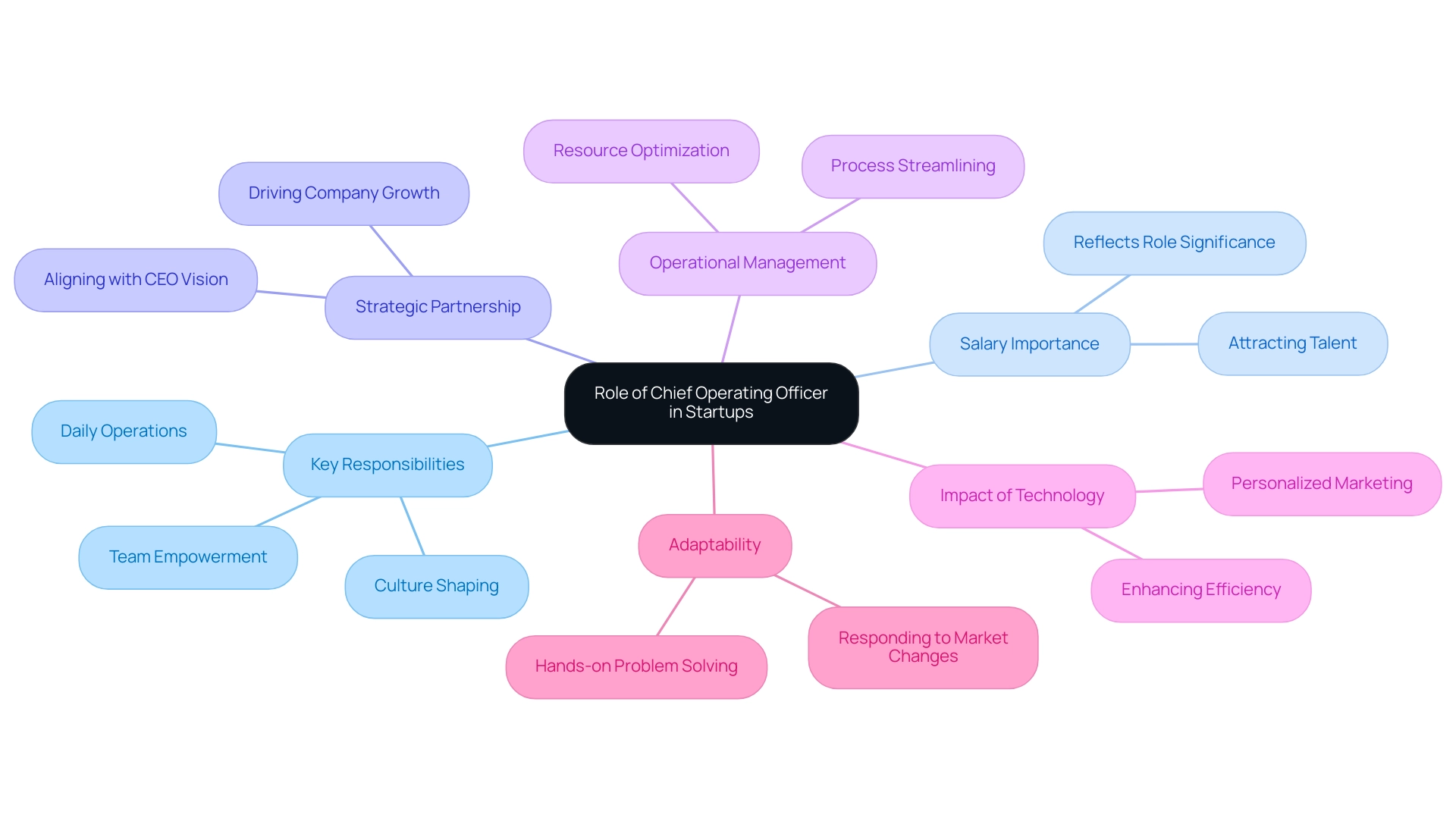
Key Responsibilities of a COO in a Startup Environment
In an entrepreneurial environment, the Chief Operating Officer (COO) plays a pivotal role, managing a diverse array of responsibilities that are essential for the organization's growth and sustainability. This includes discussions about chief operating officer salary startup, which can often be a concern for many aspiring entrepreneurs. Key responsibilities of a COO typically include:
- Operational Management: The COO oversees daily operations, ensuring that processes run smoothly and efficiently. This role is crucial, as the chief operating officer salary startup directly influences the venture's ability to scale effectively in a competitive landscape. As many of our members have experienced, operational expertise is vital for navigating the complexities of business, a sentiment echoed by Jeff Williams, COO of Apple.
- Strategic Planning: Collaborating closely with the CEO, the COO assists in formulating and executing business strategies that align with the organization's vision. This partnership is vital for navigating the complexities of the entrepreneurial ecosystem, and we understand that finding the right balance can be challenging.
- Team Leadership: A successful COO builds and leads high-performing teams, fostering a collaborative work environment that encourages innovation and productivity. This leadership is essential for maintaining morale and driving the company forward, especially during uncertain times.
- Process Optimization: The COO identifies inefficiencies within the organization and implements solutions to enhance productivity. This proactive approach not only streamlines operations but also positions the business for sustainable growth, which is something every entrepreneur aspires to achieve.
- Financial Oversight: Managing budgets and ensuring financial health through effective resource allocation is a critical duty associated with the chief operating officer salary startup. This responsibility ensures that the company remains financially viable while pursuing its growth objectives, a key concern for many in our community.
These responsibilities are not merely administrative; they are strategic imperatives that significantly affect the organization's trajectory. For instance, a case study titled "Tenacity and Determination in Leadership" highlights how a determined COO can pivot strategies in response to market challenges, ensuring that the CEO's vision is realized even in turbulent times. This tenacity is often what sets apart successful ventures from those that struggle, and we recognize the importance of resilience in this journey.
As the entrepreneurial landscape evolves in 2025, the role of the COO continues to adapt, with an increasing emphasis on inclusivity and collaboration. Founder Akim Arhipov emphasizes the club's commitment to inclusivity, believing that financial superpowers should be accessible to everyone. Insights from industry leaders underscore the importance of finding a COO who not only possesses the right skill set but also shares a strong chemistry with the CEO. This alignment is crucial for a seamless transition from initiation to scaleup, ultimately driving the organization toward its goals, and we are here to support you in this endeavor.
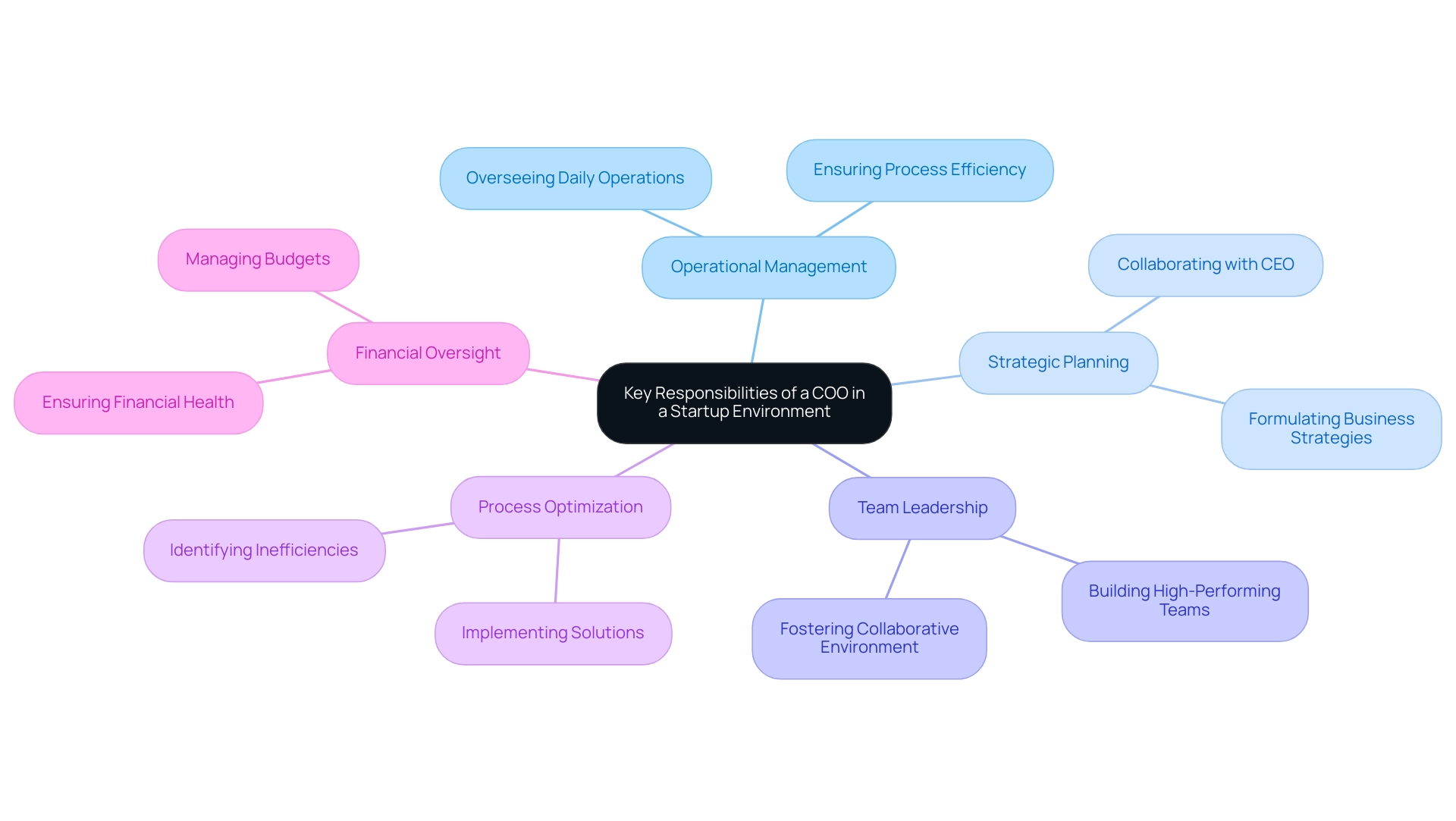
Factors Influencing COO Salaries in Startups
Several factors significantly influence COO salaries in startups, shaping the compensation landscape in this dynamic sector:
-
Company Size: We understand that larger startups typically offer higher salaries, reflecting the increased responsibilities and complexities associated with managing a larger workforce and operational scale. As companies grow, the demands on the COO expand, necessitating a more substantial chief operating officer salary startup to attract and retain top talent.
-
Industry: The field in which a new business functions plays a crucial role in compensation determination. For instance, tech startups often provide more lucrative compensation compared to traditional industries, driven by the competitive nature of the tech landscape and the high demand for skilled operational leaders.
-
Location: Geographical factors also influence pay ranges. Startups located in urban centers tend to offer higher compensation packages due to the elevated cost of living and the competitive job market in these areas. For example, the chief operating officer salary startup in London averages £238,328, which is 22% higher than the national average in the UK, along with an average bonus of £94,235.
-
Experience Level: The experience and track record of a COO are critical determinants of compensation. More experienced professionals command higher compensation, which is reflected in the chief operating officer salary startup, as their expertise and demonstrated success in previous roles are invaluable assets to a company's growth trajectory.
-
Funding Stage: The phase of financing a new venture has reached can significantly impact compensation offerings. In the context of a chief operating officer salary startup, firms in later funding rounds often have more financial resources and can afford to provide competitive salaries, whereas early-stage startups may offer lower base salaries but compensate with equity options to align interests and incentivize long-term commitment.
In addition to these factors, equity compensation is a common practice among CEOs in startups, typically ranging from 1% to 5% for non-co-founders. This structure not only enhances the overall compensation package but also aligns the interests of COOs with the organization's success, which is reflected in the chief operating officer salary startup that rewards them for their contributions to growth and stability. As noted by compensation expert Benjamin Salisbury, "Equity compensation can sweeten the (pay) pot for key recruits," making it an attractive component of the overall remuneration strategy.
Furthermore, a case study on COO equity compensation illustrates how this practice incentivizes long-term commitment and aligns COOs' interests with the company's success.
Grasping these dynamics is crucial for investors aiming to navigate the complexities of chief operating officer salary startup in emerging companies, particularly within the evolving tech landscape of 2025. We recognize that the entrepreneurial environment is presently encountering difficulties, with closures hitting a new high in the first quarter of 2024, which may impact compensation considerations for COOs. Additionally, the inclusivity emphasized by fff. Club aims to make financial superpowers accessible, highlighting the importance of equitable practices in the entrepreneurial environment.
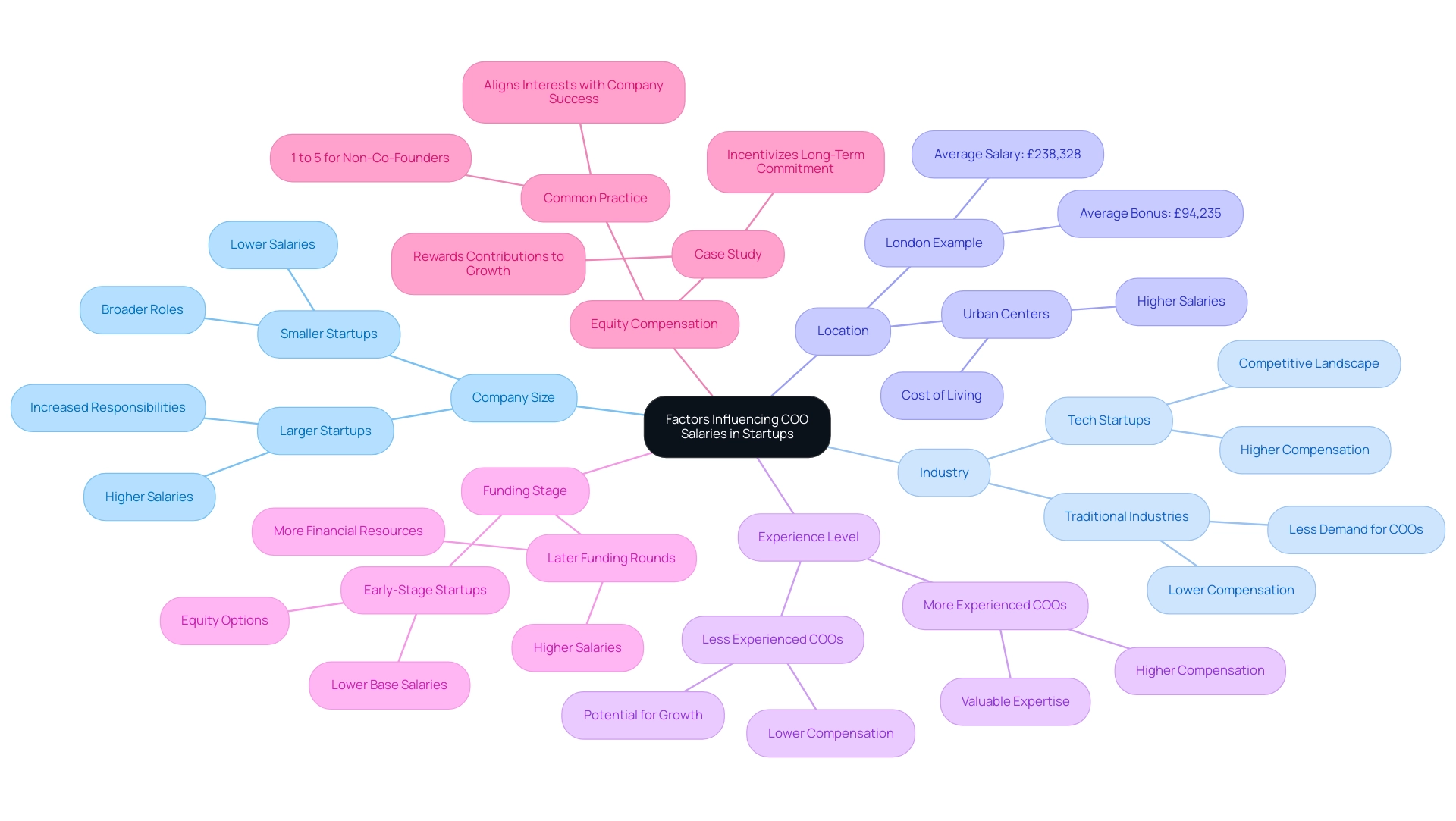
Average COO Salary Ranges in Startups
The salary of a chief operating officer in startups is influenced by various factors, including the funding stage and growth trajectory. We understand that navigating these financial landscapes can be challenging for tech investors. Recent findings reveal distinct compensation ranges across different stages of business development:
- Seed-Stage Enterprises: COOs typically earn between $100,000 and $150,000. This range reflects the early-stage characteristics of these businesses, where resources may be limited, yet the potential for growth is substantial. As many of our members have experienced, this stage can be both exciting and daunting.
- Series A Startups: As startups secure further funding, the chief operating officer salary generally rises to between $150,000 and $200,000. This increase often mirrors the added responsibilities and the necessity for experienced leadership to navigate the complexities of scaling. We understand that these transitions can come with heightened expectations and pressures.
- Later-Stage Startups: In more established companies, the chief operating officer salary can exceed $200,000, with some positions reaching upwards of $300,000, particularly in high-growth sectors. At this stage, the role often encompasses broader strategic responsibilities, justifying the higher compensation. We recognize that these figures can evoke a mix of hope and concern for investors assessing potential returns.
For professionals with 3-5 years of experience, the chief operating officer salary is reported to range from £120,000 to £160,000, indicating that experience significantly impacts compensation levels. Additionally, the average reported by an Executive Search recruitment agency stands at £115,590 per year, based on 1,301 compensations, further validating the discussion around COO remuneration.
Moreover, equity compensation plays a crucial role in the overall remuneration package, including the chief operating officer salary. Many new ventures offer stock options or equity stakes, aligning the interests of the COO with the long-term success of the organization. This incentive framework not only attracts exceptional talent but also empowers COOs to enhance organizational performance effectively. We understand how vital these incentives are in fostering commitment and driving success.
Comprehending these compensation benchmarks, particularly the chief operating officer salary, is essential for investors looking to evaluate the worth and potential of leadership in emerging businesses. By recognizing the chief operating officer salary and the financial expectations of COOs at various funding stages, investors can make more informed decisions regarding their investments in the tech landscape. Furthermore, the fff.club community enhances this investment experience by providing a collaborative environment for due diligence and co-investing opportunities. This allows tech investors to build valuable connections and gain insights into private market opportunities across venture capital, private credit, and real estate. Notably, the founders of fff.club, Akim Arhipov and Tim Vaino, bring significant expertise to the table, with backgrounds in wealth management and law, respectively. Their leadership fosters a community-driven approach that empowers tech investors with specific insights and opportunities.
It is also important to note that chief operating officer salary variations exist based on organization type, with larger global businesses typically offering higher pay compared to early-stage scale-ups. We acknowledge that understanding these dynamics can be crucial for making informed investment choices.
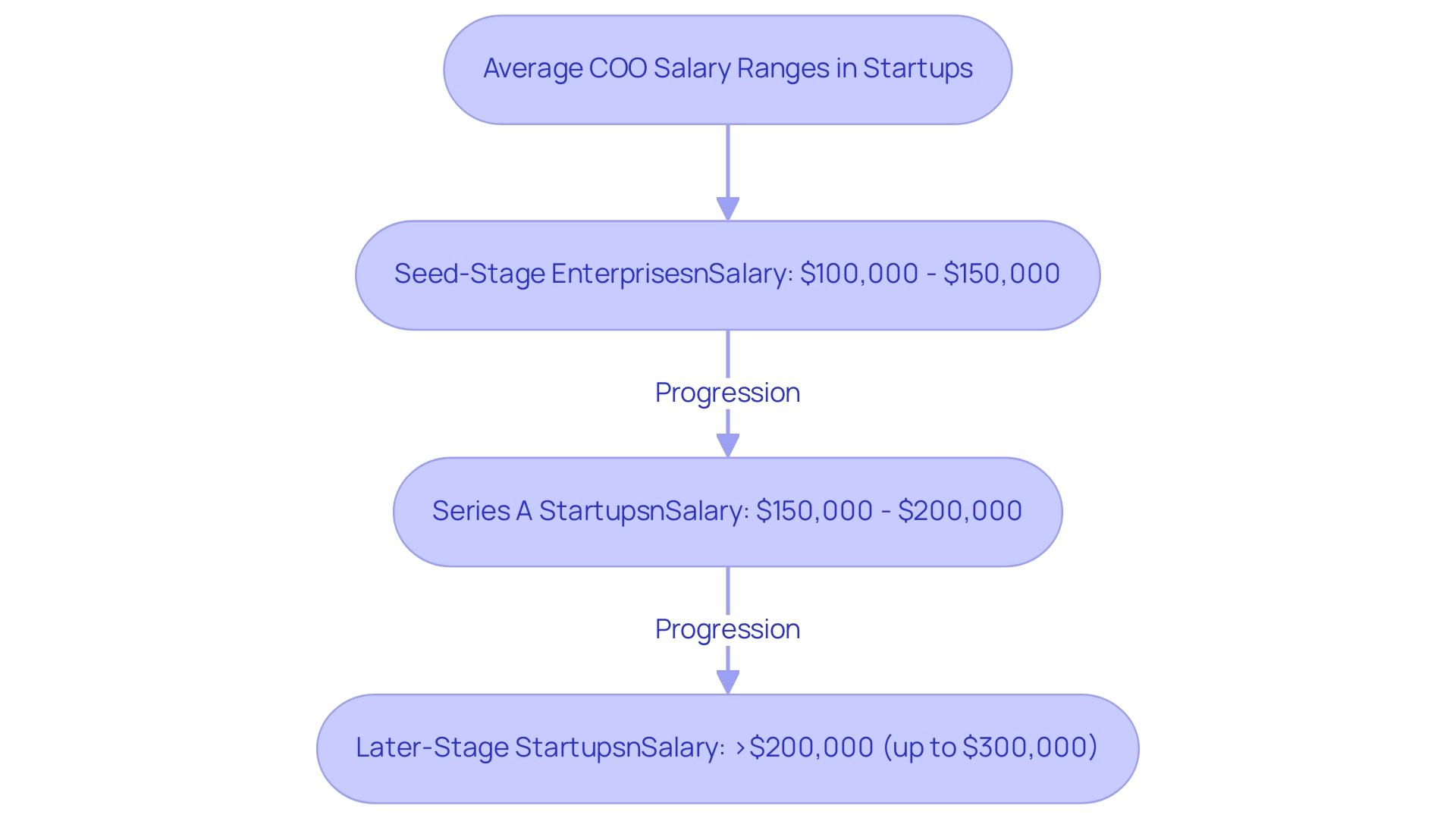
Equity Compensation: A Key Component of COO Salaries
Equity compensation plays a pivotal role in determining the chief operating officer salary startup within new ventures, as it serves as a vital mechanism to align the interests of COOs with those of the organization and its investors. We understand that navigating the complexities of compensation can be challenging, and typically, COOs are granted equity stakes ranging from 1% to 5% of the organization, a figure that can vary based on their responsibilities and the entity's developmental stage. This equity not only represents a potential financial boon but also acts as a powerful incentive for COOs to drive long-term growth and success.
The importance of equity compensation cannot be overstated; it directly impacts COO performance and commitment. Research indicates that when COOs have a stake in the company, they are more likely to make decisions that enhance overall value, fostering a culture of accountability and shared success. As many of our members have experienced, new ventures with equity-compensated COOs often see improved operational efficiency and strategic alignment, leading to better financial outcomes.
Moreover, industry experts emphasize that equity should be a fundamental consideration when evaluating a COO's compensation package. Jason Heltzer, a seasoned venture capitalist, notes, "In a seed deal, you normally do not see a COO," highlighting the rarity of such roles in early-stage startups. Founders who are managing multiple roles may struggle to find time for recruiting a COO, which is essential for driving growth within their team. We understand that this can be a daunting task, but recognizing the importance of this role is crucial.
As organizations mature, the need for a COO becomes more pronounced, particularly when founders are stretched thin. This is often the right moment to consider equity as part of the compensation strategy, ensuring that the COO is motivated to contribute to the company's growth trajectory. Personal stories from our community often highlight how this strategic move has made a significant difference.
Case studies further illustrate the impact of equity on COO performance. For example, a notable case showed that a Series A company that integrated equity compensation for its COO saw a marked increase in operational performance and employee satisfaction, ultimately leading to a successful funding round. This reinforces the notion that equity compensation is not merely a financial arrangement but a strategic tool that can significantly enhance a new venture's potential.
Furthermore, recruiting a COO should correspond with the organization's needs rather than following a particular funding stage or workforce size, as the optimal moment to hire is determined by the obstacles encountered by the business. We recognize that each startup's journey is unique, and timing can be everything.
In conclusion, when assessing a chief operating officer salary startup, investors should prioritize a balanced approach that includes both salary and equity. This dual focus not only motivates COOs to align their objectives with those of the organization but also cultivates a cooperative atmosphere that can propel significant growth in the competitive entrepreneurial landscape. Together, we can navigate these challenges and foster a thriving community.
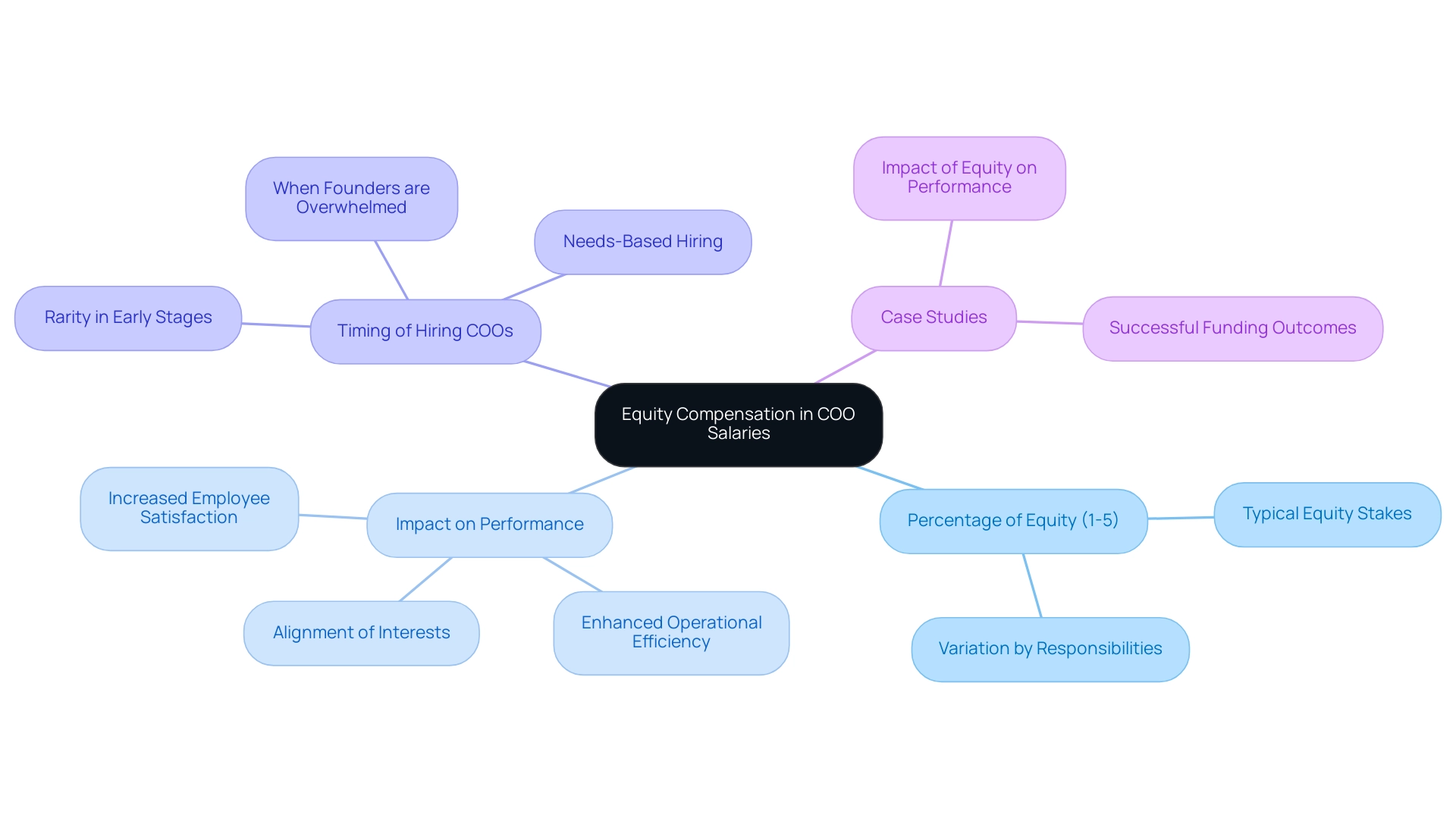
Common Hiring Mistakes to Avoid When Recruiting a COO
When recruiting a Chief Operating Officer (COO), startups face significant challenges that can impact their hiring success. It’s essential to be vigilant in avoiding common pitfalls that may arise during this critical process.
- Rushing the Hiring Process: It’s understandable that the pressure to fill positions quickly can be overwhelming. In fact, a notable 30% of poor hires result from this urgency. Taking the necessary time to thoroughly vet candidates is crucial for identifying the right fit for your organization, ensuring that you don’t compromise on quality in your haste.
- Neglecting Cultural Fit: The alignment of a COO with your company’s culture is vital for fostering a positive work environment. Many of us have felt the impact of workplace culture, and surveys indicate that 80% of respondents believe inclusivity is essential in hiring. It’s worth noting that many candidates have left jobs for more inclusive workplaces. This highlights the importance of cultural compatibility in attracting and retaining top talent. As illustrated in the case study titled "Importance of Inclusivity in Hiring," organizations are increasingly tailoring their hiring strategies to foster inclusivity, recognizing that a diverse workforce is not just beneficial but crucial for improving employee satisfaction.
- Overlooking Soft Skills: While technical expertise is undeniably important, we must not overlook the significance of soft skills such as communication, empathy, and leadership. These attributes can profoundly impact team dynamics and overall organizational effectiveness, making them essential qualities for a COO.
- Failing to Define the Role Clearly: A well-defined job description is essential for setting clear expectations and attracting suitable candidates. Without clarity, new ventures risk attracting individuals who may not align with the specific needs of the role, potentially leading to misunderstandings down the line.
As Agatha Knapek wisely states, "Sometimes you have to fire, but you don't have to be a jerk," reminding us of the importance of maintaining a respectful hiring process. By steering clear of these common mistakes and emphasizing a thoughtful and inclusive hiring process, new companies can significantly enhance their chances of hiring a successful COO. Furthermore, fostering an environment where team members can co-invest and learn from one another not only improves recruitment outcomes but also contributes to a more cohesive and effective leadership team.
Additionally, it’s important to recognize that much of the hiring process is often outsourced to companies like Randstad, Manpower, and Adecco. This can significantly influence the hiring landscape for new businesses. By understanding these dynamics, new ventures can better navigate the complexities of COO recruitment, ensuring they find the right leader to guide their growth.
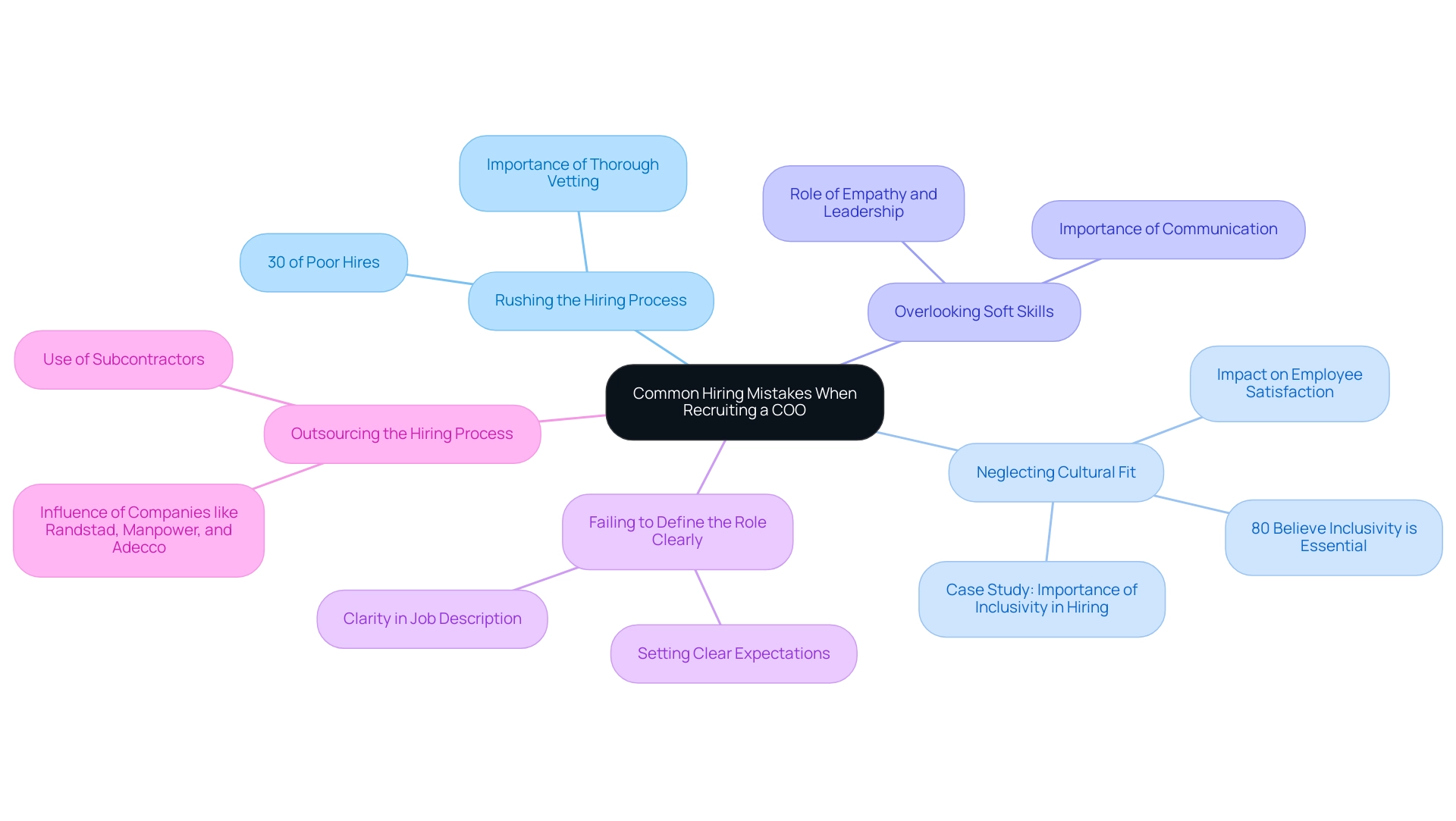
When Is the Right Time to Hire a COO in a Startup?
Determining the optimal time to hire a Chief Operating Officer (COO) is pivotal for a new business's trajectory. We understand that several key indicators can signal the necessity for this strategic role:
- Rapid Growth: Startups experiencing rapid expansion often face increased operational complexity. A COO can implement systems and processes that facilitate scaling, ensuring that growth is sustainable and manageable.
- Operational Inefficiencies: Persistent inefficiencies in workflows or processes can hinder a new business's performance. The introduction of a COO can provide the expertise needed to identify bottlenecks and streamline operations, ultimately enhancing productivity.
- CEO Overload: When a CEO finds themselves bogged down by daily operational tasks, it may be time to consider hiring a COO. This transition enables the CEO to shift their attention toward strategic initiatives and long-term vision, which are essential for the company's success.
- Funding Milestones: Achieving significant funding milestones often brings about new challenges and opportunities. A COO can play a crucial role in managing the complexities associated with growth, ensuring that the new venture capitalizes on its funding effectively.
Recognizing these signs early can empower new businesses to make timely and informed hiring decisions. As many of our members have experienced, having a clearly defined COO role is essential to avoid misalignment and disappointment post-hire. In fact, hiring a COO without a clear role definition can lead to significant challenges, emphasizing the need for clarity from the outset.
By documenting key responsibilities and aligning expectations, new ventures can foster a collaborative environment where both the CEO and COO work towards common goals, enhancing overall operational effectiveness.
In 2025, expert opinions emphasize that the decision to hire a COO should not be taken lightly. Indicators such as the need for operational oversight, the ability to manage increased complexity, and the desire to free the CEO for strategic planning are critical considerations. As Mark Suster, a seasoned entrepreneur turned venture capitalist, notes, "I think the best way to protect the ego of the rightly deserving status of non-CEO co-founders is to preserve the co-founder name in their title as is, 'VP Product & Co-Founder' or 'VP Sales & Co-Founder.'"
This approach can help maintain morale and clarity within the leadership team, further supporting a cohesive operational strategy. Additionally, performance bonuses may be offered to COOs, especially in later-stage companies, which should be considered when discussing the chief operating officer salary startup and compensation packages.
By understanding these dynamics and reflecting the values of inclusivity promoted by fff.club, new ventures can better navigate the complexities of growth and position themselves for long-term success.
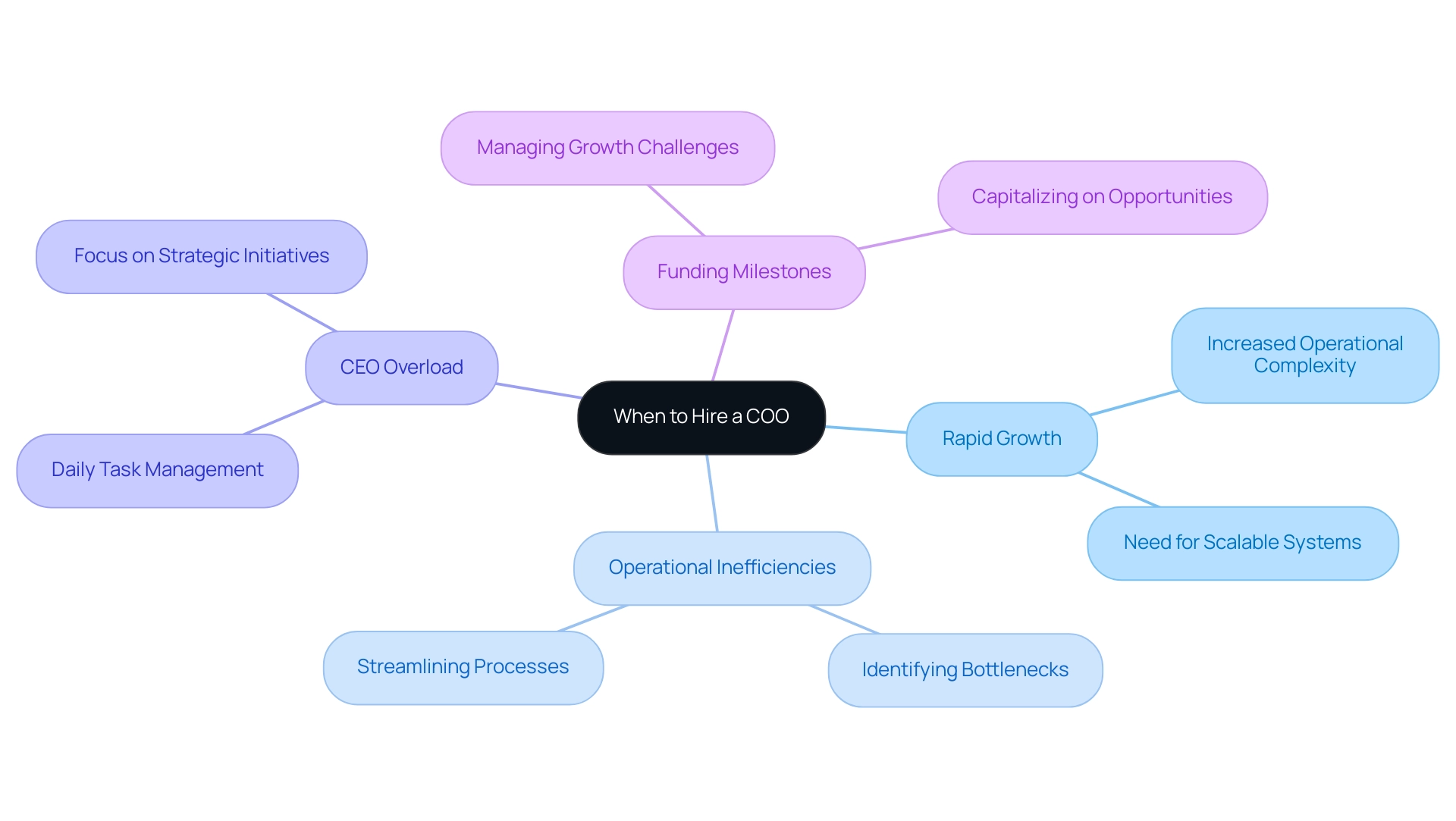
Essential Qualities and Skills for a Successful COO
When hiring a Chief Operating Officer (COO), startups should prioritize essential qualities and skills that foster effective leadership and operational success.
-
Leadership Skills: A successful COO must possess the ability to lead teams effectively, fostering an environment of collaboration and motivation. This is particularly crucial in new ventures, where team dynamics can significantly influence overall performance. We understand that building a cohesive team can be challenging, but a nurturing leader can make all the difference.
-
Strategic Thinking: The capacity for strategic thinking is vital. A COO should align operational activities with the company's long-term vision, ensuring that every action contributes to overarching goals. As many of our members have experienced, blending research with practical approaches, as emphasized by Columbia Business School, can help develop these strategic insights.
-
Operational Expertise: A deep understanding of operational processes and best practices is essential for optimizing efficiency. This expertise allows the COO to identify areas for improvement and implement effective solutions. Research indicates that organizations investing in developing these skills in their COOs can enhance leadership diversity and performance, ultimately leading to better outcomes. It’s heartening to see how focused development can yield such positive results.
-
Adaptability: Given the dynamic nature of the entrepreneurial environment, a COO must be flexible and capable of adapting to rapidly changing circumstances. This quality is vital for navigating challenges and seizing new opportunities. The focus on community involvement and education, as expressed by founder Akim Arhipov, strengthens the need for adaptability in a cooperative entrepreneurial culture. We understand that adaptability is not just a skill but a mindset that can empower teams to thrive.
-
Strong Communication: Effective communication skills are paramount for a COO. They must convey the company's goals and strategies clearly to various stakeholders, ensuring alignment and understanding across the organization. Industry leaders emphasize that a great COO is not only a strategist but also an effective communicator and collaborator. As Alexander Tuff, a prominent COO, notes, "Most importantly, a COO needs to be an effective communicator and collaborator with whom people want to work."
In 2025, focusing on these qualities remains essential, as new ventures continue to face unique challenges in a competitive landscape. For instance, a study on the COO to CEO succession pipeline highlighted the importance of understanding personality differences in coaching and development plans, which can significantly impact leadership effectiveness. Additionally, the statistic from YEC, which has created tens of thousands of jobs, underscores the impact of effective leadership in driving growth and innovation.
By prioritizing these essential qualities, startups can significantly enhance their chances of hiring a successful COO, ultimately affecting the chief operating officer salary startup and driving growth and innovation. Let’s embrace these qualities together, as they not only shape the future of startups but also foster a supportive community for all involved.
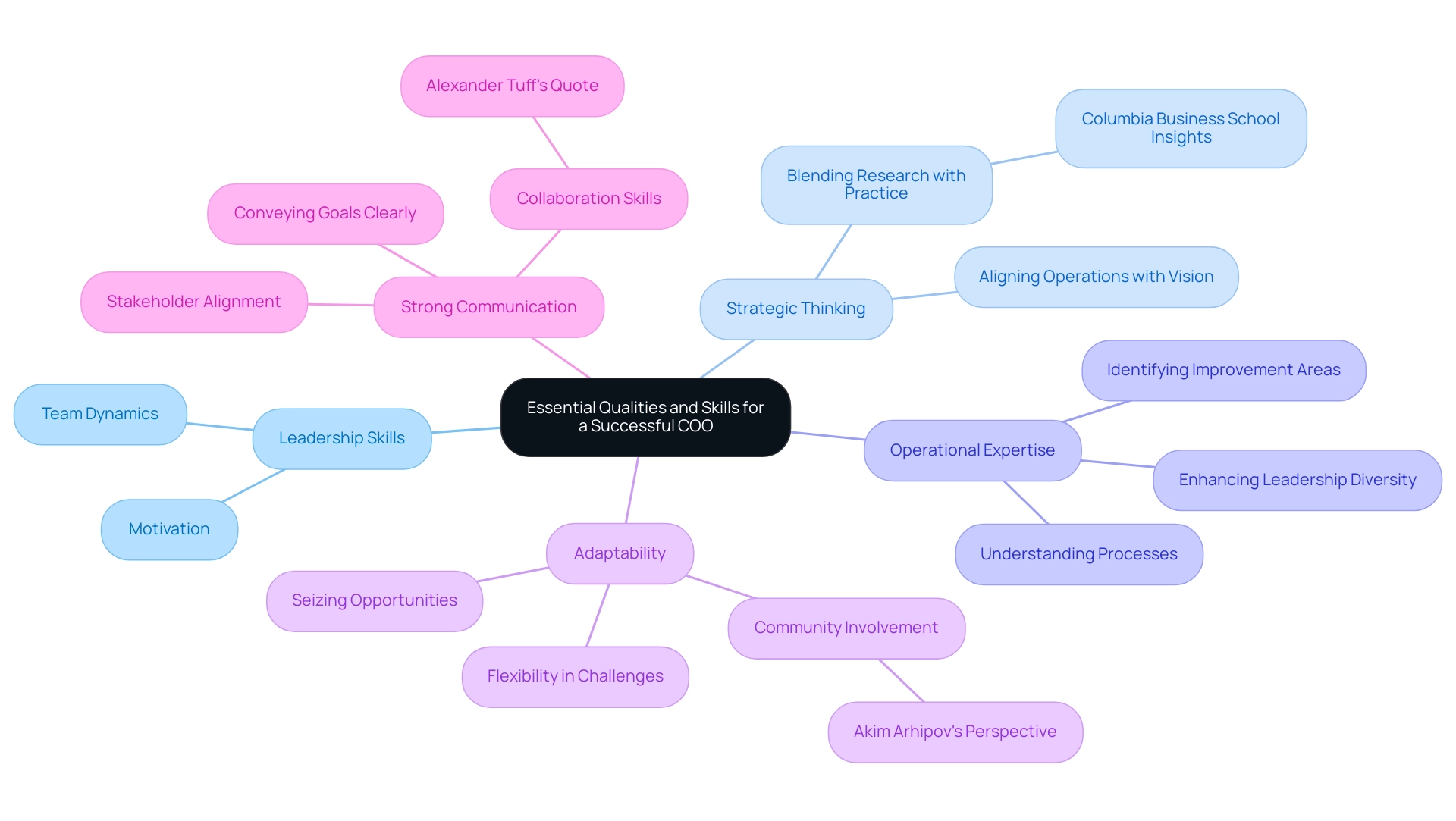
Conclusion
The multifaceted role of the Chief Operating Officer (COO) in startups has never been more crucial, especially as the landscape continues to evolve in 2025. We understand that COOs are not merely operational overseers; they are strategic partners who align daily activities with the CEO's vision while fostering a collaborative culture that drives innovation. With responsibilities that span operational management, strategic planning, team leadership, and process optimization, the COO is integral to the sustainable growth of a startup.
Compensation for COOs varies significantly based on factors such as company size, industry, and funding stage. It’s important to recognize that equity compensation plays a pivotal role in aligning their interests with the company’s success. Understanding these salary dynamics is essential for attracting top talent and ensuring that COOs are motivated to drive performance effectively.
Moreover, the timing of hiring a COO is critical. Startups should be vigilant in recognizing signs of operational overload or rapid growth. We understand that avoiding common hiring mistakes—such as neglecting cultural fit and rushing the process—can significantly enhance recruitment outcomes.
Ultimately, the qualities and skills of a successful COO—leadership, strategic thinking, operational expertise, adaptability, and strong communication—are essential for navigating the complexities of the startup environment. As many of our members have experienced, the startup ecosystem continues to face challenges, and the importance of a well-structured COO role cannot be overstated. By prioritizing these elements, startups can position themselves for long-term success and innovation in an increasingly competitive landscape. We are here to support you in this journey, fostering a community that encourages growth and resilience.
Frequently Asked Questions
What is the role of the Chief Operating Officer (COO) in a startup?
The COO is responsible for managing daily operations and ensuring that the strategic vision set by the CEO is effectively realized. They oversee various departments and harmonize operational activities with the organization's broader objectives.
Why is the COO's salary important in a startup?
The COO's salary is significant as it reflects the crucial nature of their role in managing operations and serving as a strategic partner in advancing the company's vision, especially in the fast-paced environment of new ventures.
How is the COO's role evolving as we approach 2025?
The COO's role is evolving to emphasize technology, personalized marketing, and operational efficiency, which are essential for navigating the complexities of new venture operations and ensuring sustainable growth.
What are some key responsibilities of a COO?
Key responsibilities include operational management, strategic planning, team leadership, process optimization, and financial oversight. Each of these responsibilities is vital for the organization's growth and sustainability.
How does the COO contribute to a startup's financial health?
The COO manages budgets and ensures effective resource allocation, which is critical for maintaining financial viability while pursuing growth objectives.
What qualities should a COO possess to be successful in a startup?
A successful COO should have operational expertise, adaptability, a hands-on approach to problem-solving, and the ability to build high-performing teams while fostering a collaborative work environment.
How do COOs impact organizational culture?
COOs play a crucial role in nurturing a productive work environment and shaping the organizational culture, which is essential for maintaining morale and driving the company forward.
Why is collaboration between the COO and CEO important?
Collaboration is vital for formulating and executing business strategies that align with the organization's vision, ensuring a seamless transition from initiation to scaleup.
What challenges do COOs face in the current entrepreneurial landscape?
COOs face challenges related to financial management, operational efficiency, and the need to innovate and scale in a competitive market, particularly in light of recent economic trends.
